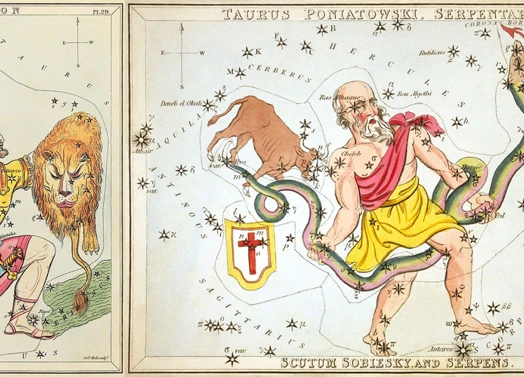Unraveling the Legends and Symbolism of Ophiuchus
Have you ever heard of the mysterious and enigmatic zodiac sign, Ophiuchus? Often referred to as the “13th sign,” Ophiuchus has captivated the minds and imaginations of astrologers, astronomers, and mythologists for centuries. In this intriguing article, we will delve into the origins of Ophiuchus, exploring its ancient Greek and Egyptian connections. We will also uncover the powerful symbolism associated with this fascinating zodiac sign, including its association with serpents, wisdom, healing, and transformation. We will delve into the constellation of Ophiuchus itself, examining its position in the sky and its notable features. Finally, we will unravel the significance of Ophiuchus in modern culture, from its portrayal in popular media to the controversies it has sparked in the astrological community. So, join us on this captivating journey as we unravel the legends and symbolism of Ophiuchus, shedding light on this mysterious and often misunderstood zodiac sign.
Contents
- The Origins of Ophiuchus
- The Symbolism of Ophiuchus
- The Ophiuchus Constellation
- The Significance in Modern Culture
- Conclusion
-
Frequently Asked Questions
- 1. What does Ophiuchus symbolize in astrology?
- 2. Is Ophiuchus considered a zodiac sign?
- 3. How does Ophiuchus relate to ancient Greek mythology?
- 4. What is the significance of the serpent symbolism in Ophiuchus?
- 5. Can Ophiuchus have an impact on astrological compatibility?
- 6. How can Ophiuchus be identified in the night sky?
- 7. Are there any notable features within the Ophiuchus constellation?
- 8. Does Ophiuchus hold any astrological significance in predicting future events?
- 9. How has Ophiuchus been portrayed in popular media?
- 10. Why is there controversy surrounding Ophiuchus in astrology?
- References
-
Frequently Asked Questions
- 1. Can you provide a brief overview of Ophiuchus?
- 2. What is the origin of Ophiuchus?
- 3. How does Ophiuchus relate to Greek mythology?
- 4. What role does Egyptian culture play in Ophiuchus?
- 5. How is Ophiuchus interpreted in astrology?
- 6. What is the symbolism behind the serpent in Ophiuchus?
- 7. What does Ophiuchus signify in terms of wisdom and healing?
- 8. How does Ophiuchus relate to transformation and rebirth?
- 9. Where can the Ophiuchus constellation be found in the sky?
- 10. Why is Ophiuchus significant in modern culture?
- References
- Read More
The Origins of Ophiuchus
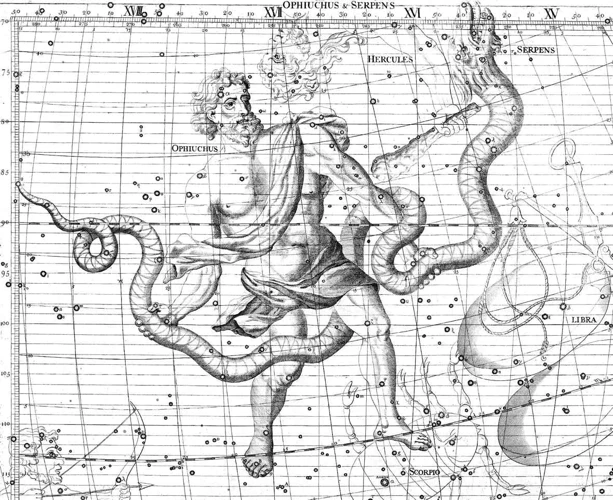
The origin of Ophiuchus can be traced back to ancient Greek mythology, where it is believed to represent the figure of Asclepius, the Greek god of medicine and healing. Legend has it that Asclepius was a skilled physician who possessed the ability to resurrect the dead. This extraordinary power alarmed the gods, as it upset the natural order of life and death. As a result, Zeus, the king of the gods, struck down Asclepius with a thunderbolt. However, in recognition of his healing abilities, Zeus later immortalized Asclepius by placing him in the stars as the constellation Ophiuchus.
In addition to its Greek origins, Ophiuchus also bears influence from Egyptian culture. In Egyptian mythology, Ophiuchus is associated with Imhotep, an ancient Egyptian high priest, physician, and architect of the Step Pyramid of Djoser. Imhotep was revered as a god of medicine and healing, and his knowledge was believed to be divinely inspired. This connection highlights the universal recognition and reverence for the healing and medicinal properties associated with the Ophiuchus constellation.
The interpretation of Ophiuchus in astrology is another aspect of its origin that is worth exploring. While most astrological systems recognize only 12 zodiac signs, Ophiuchus is often referred to as the “13th sign.” In astrology, Ophiuchus is associated with traits such as wisdom, intuition, healing abilities, and a deep connection to the spiritual realm. Its inclusion in astrology has sparked debates and discussions among astrologers, with some embracing its significance and others dismissing it as a relatively new addition without historical grounding.
The origins of Ophiuchus are rooted in ancient mythology, showcasing its connections to the realms of healing and medicine. From the Greek figure of Asclepius to the Egyptian influence of Imhotep, Ophiuchus has transcended cultural boundaries and continues to intrigue astrologers and enthusiasts alike with its mysterious and unorthodox presence in the zodiac.
1. Ancient Greek Mythology
In ancient Greek mythology, Ophiuchus is closely associated with the figure of Asclepius. Asclepius, the son of Apollo and the mortal woman Coronis, possessed exceptional medical skills from a young age. He grew up to become a highly skilled physician, renowned for his ability to heal the sick and even raise the dead. Legend has it that Asclepius learned the art of medicine from the wise centaur Chiron, who taught him the secrets of nature’s healing powers.
Asclepius became so proficient in his healing abilities that he could revive mortals from the brink of death. This alarmed the gods, as it disrupted the natural cycle of life and death. Consequently, Zeus, the king of the gods, struck down Asclepius with a thunderbolt, fearing that mortal beings might become immortal.
However, Asclepius’ talents and contributions to humanity were highly regarded, and he was eventually immortalized as the constellation Ophiuchus. Represented as a man holding a snake, Ophiuchus symbolizes the wisdom, healing, and transformative powers associated with Asclepius. The snake entwined around Ophiuchus’ body represents the healing staff, known as the Rod of Asclepius, which has become a widely recognized symbol of medicine.
The story of Asclepius and the inclusion of Ophiuchus in Greek mythology highlight the importance of healing and the pursuit of knowledge in ancient Greek society. The reverence for medicine and the connection between healing and the divine make Ophiuchus a symbol of hope, resilience, and the potential for transformation through the power of healing.
2. Influence from Egyptian Culture
The influence of Egyptian culture on the significance of Ophiuchus cannot be overlooked. In Egyptian mythology, the constellation of Ophiuchus is closely associated with the figure of Imhotep. Imhotep was an ancient Egyptian high priest, physician, and architect who lived during the 27th century BCE. He is remembered as a revered and deified figure in Egyptian history, known for his immense wisdom and profound impact on medicine and healing practices.
Imhotep’s connection to Ophiuchus stems from his association with the art of medicine and healing. He was considered the god of medicine and was believed to possess divine healing abilities. Imhotep’s knowledge and expertise were highly regarded, and his influence extended beyond his time, making him a significant figure in Egyptian culture.
In Egyptian mythology, Ophiuchus and Imhotep are closely intertwined, both symbolizing the transformative power of healing and the pursuit of knowledge. Imhotep’s contributions to medicine and architecture were so impressive that he became a revered and respected deity, with temples and statues dedicated to his worship throughout ancient Egypt. The impact of Imhotep’s teachings and practices on Egyptian society underscores the sacred and influential role of Ophiuchus in Egyptian culture.
The influence of Egyptian culture on Ophiuchus continues to captivate modern-day astrologers, historians, and enthusiasts. The connection between Ophiuchus and Imhotep serves as a reminder of the historical significance and universal recognition of healing and the pursuit of knowledge. To this day, the rich cultural heritage of Imhotep and his association with Ophiuchus inspire individuals to explore the profound connections between mythology, astrology, and the human quest for spiritual and physical well-being.
3. Interpretations in Astrology
In astrology, the interpretations of Ophiuchus vary, as it is not officially recognized as one of the traditional zodiac signs. Nevertheless, those who embrace Ophiuchus as the “13th sign” believe it carries significant symbolism and qualities. Ophiuchus is often associated with wisdom and intuition, reflecting the serpent symbolism in its constellation. People born under Ophiuchus are believed to possess keen insight, a deep spiritual connection, and the ability to understand and navigate complex emotions.
Ophiuchus is associated with healing abilities and a strong inclination towards the medical field or alternative healing practices. Those with Ophiuchus placements are believed to be powerful healers, using their intuitive and empathetic nature to restore balance and promote well-being in others.
Additionally, Ophiuchus is seen as a transformative sign, representing personal growth and rebirth. Individuals with Ophiuchus placements are believed to undergo significant inner transformations throughout their lives, constantly shedding old beliefs and embracing new perspectives.
It is important to note that while some astrologers incorporate Ophiuchus into their readings and interpretations, it is not universally accepted or acknowledged by all astrological systems. Traditional astrologers typically adhere to the 12 sign zodiac system, focusing on the signs that align with the path of the Sun. Nonetheless, the inclusion of Ophiuchus in astrological discussions sparks curiosity and challenges traditional notions, offering alternative perspectives on personality traits, compatibility, and life paths.
While Ophiuchus may be considered a lesser-known and debated aspect of astrology, its interpretations resonate with individuals who connect with its unique symbolism and characteristics. Whether embraced as a significant influence or viewed as an intriguing concept, Ophiuchus continues to garner attention and exploration within the realm of astrology.
The Symbolism of Ophiuchus
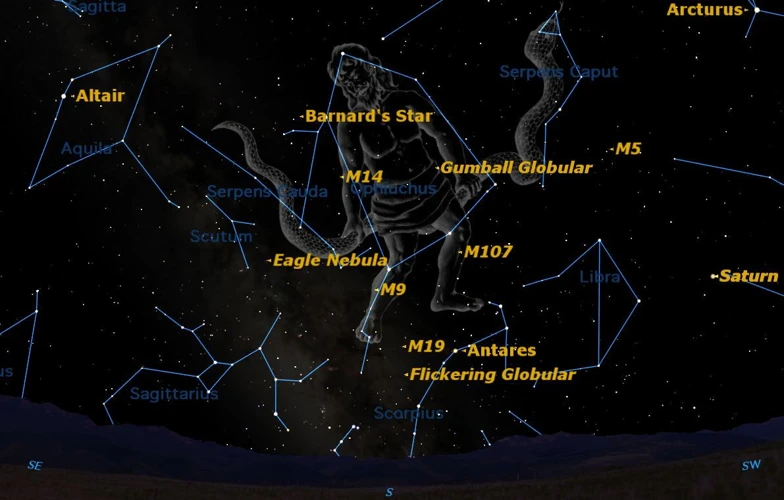
The symbolism of Ophiuchus is rich and multifaceted, drawing upon various themes and archetypes. One of the primary symbols associated with Ophiuchus is that of the serpent. In many cultures, serpents represent healing, transformation, and rebirth. This symbolism is reflective of the constellation’s association with Asclepius, the Greek god of medicine and healing. The serpent intertwining around the staff, known as the Rod of Asclepius, has become a universal symbol of medical professions. This symbolizes the power of healing and the ability to bring about positive transformation in the lives of others.
Another key aspect of Ophiuchus symbolism is wisdom and healing. As a zodiac sign, Ophiuchus is believed to possess profound wisdom and intuition. Those born under this sign are thought to have natural healing abilities and a deep connection to the spiritual realm. Ophiuchus individuals are often seen as mystical and insightful, able to tap into hidden knowledge and bring about healing and transformation in their own lives and the lives of others.
Transformation and rebirth are fundamental themes embraced by Ophiuchus symbolism. The constellation’s association with the serpent, an ancient symbol of shedding old skin and undergoing transformation, is highly relevant. Ophiuchus is believed to embody the energy of change and personal growth. Individuals influenced by this sign often experience significant transformations throughout their lives, undergoing profound shifts in their perspectives, beliefs, and values. This symbolizes the never-ending cycle of death and rebirth, reflecting the transformative power of healing and personal evolution.
The symbolism of Ophiuchus encompasses the serpent as a symbol of healing and transformation, wisdom and intuition, and the continuous cycle of rebirth. It is through these symbols that Ophiuchus individuals are believed to bring about healing, personal growth, and positive transformation in their lives and the lives of those around them. This rich symbolism adds to the allure and intrigue of Ophiuchus as a unique and powerful zodiac sign.
1. Serpent Symbolism
Serpents have long been associated with symbolism and mythology, and Ophiuchus is no exception. The serpent holds significant symbolism within the constellation and its representation. In various cultures and belief systems, serpents are often seen as symbols of wisdom, transformation, and healing, which are also key characteristics associated with Ophiuchus.
In Greek mythology, the rod of Asclepius, associated with the god of healing and medicine, features a serpent entwined around a staff. This symbol, known as the Rod of Asclepius, is still widely recognized as a symbol of the medical profession today. The serpent represents rejuvenation and transformation, shedding its skin and emerging anew, which parallels the healing and transformative qualities attributed to Ophiuchus.
Similarly, serpents hold great importance in Hindu mythology. In Hinduism, serpents are revered as symbols of divinity and carry deep spiritual significance. The Nagas, serpent deities, are associated with fertility, protection, and wisdom. Their role in Hindu mythologies, such as the story of the snake-god Shesha supporting the world on his hoods, further emphasizes their symbolic power and connection to Ophiuchus.
Within the realm of astrology, serpents are seen as powerful symbols in their own right. The serpent represents the kundalini energy, a dormant spiritual energy coiled at the base of the spine, waiting to be awakened and ascend. This concept aligns with Ophiuchus as a symbol of transformation and spiritual growth.
The serpent symbolism associated with Ophiuchus is rich and multifaceted, encompassing themes of wisdom, healing, transformation, and spiritual enlightenment. It serves as a reminder of the potential for growth and renewal that lies within us all. As we explore the symbolism of Ophiuchus, the serpent’s presence weaves a thread of profound meaning, connecting ancient mythologies, philosophical concepts, and astrological interpretations in a captivating tapestry of understanding.
2. Wisdom and Healing
Wisdom and healing are prominent themes associated with Ophiuchus. In astrology, Ophiuchus is often regarded as a symbol of profound wisdom and intuitive abilities. Those born under the influence of Ophiuchus are believed to possess a deep understanding of the mysteries of life and possess an innate sense of knowing. They are thought to have a natural inclination towards spiritual and philosophical pursuits, seeking truth and enlightenment in their journey.
The healing aspect tied to Ophiuchus stems from its association with the Greek god Asclepius and the Egyptian figure Imhotep. Both Asclepius and Imhotep were revered for their exceptional healing abilities and knowledge of medicine. As a result, Ophiuchus is often associated with healing practices, alternative therapies, and holistic approaches to well-being. People born under this sign are believed to possess an innate talent for healing, whether in physical, emotional, or spiritual realms.
The significance of wisdom and healing in Ophiuchus extends beyond astrology. Throughout history, various cultures have recognized the importance of these qualities. In Hindu mythology, for example, wisdom and healing are highly valued attributes associated with deities such as Lord Dhanvantari, who is revered as the god of Ayurveda, the ancient Indian system of medicine. The reverence for wisdom and healing in different mythologies demonstrates the universal significance of these qualities, further enhancing the symbolism of Ophiuchus as a celestial embodiment of these virtues.
Wisdom and healing are integral to the symbolism of Ophiuchus. Astrologically, this zodiac sign represents deep wisdom, intuition, and a connection to spiritual realms. Additionally, its association with figures like Asclepius and Imhotep reinforces its connection to healing and medicine. The recognition of wisdom and healing in various mythologies underscores the universal significance of these qualities, elevating the importance of Ophiuchus as a celestial entity embodying these virtues.
3. Transformation and Rebirth
The symbolism of Ophiuchus extends beyond its association with wisdom and healing. Another significant aspect of this enigmatic zodiac sign is the theme of transformation and rebirth. Ophiuchus represents the concept of shedding old skin and embracing personal growth and evolution.
In many mythological traditions, serpents are seen as symbols of transformation due to their ability to shed their skin. Ophiuchus, with its close association with serpents, reflects the notion of transformation in a profound way. Just as a serpent leaves behind its old skin, Ophiuchus encourages individuals to release their old identities, beliefs, and patterns in order to evolve and embrace new beginnings.
The theme of transformation and rebirth also aligns with the celestial symbolism of Ophiuchus. The constellation itself is located near the center of the Milky Way, which is considered a site of intense stellar activity and cosmic transformation. This celestial position enhances the symbolic significance of Ophiuchus as a catalyst for personal growth and spiritual renewal.
Astrologically, individuals with Ophiuchus as an important aspect in their birth chart may experience periods of profound transformation and rebirth throughout their lives. These transformative moments can be triggered by significant events, planetary alignments, or personal awakenings. Such spiritual and personal growth often leads to a deep sense of self-discovery and a renewed purpose in life.
Ophiuchus serves as a reminder that transformation and rebirth are natural and essential aspects of the human journey. Embracing change and allowing oneself to shed old skin enables personal growth, spiritual evolution, and a deeper connection with inner wisdom. Exploring these themes can further enhance our understanding of the multi-faceted symbolism of Ophiuchus and its significance in astrology.
The theme of transformation and rebirth is a powerful and integral aspect of Ophiuchus. As individuals venture through life’s twists and turns, Ophiuchus encourages them to embrace change, shed the old, and allow for personal evolution. This profound symbolism adds depth and intrigue to the enigmatic nature of Ophiuchus as a captivating zodiac sign.
The Ophiuchus Constellation
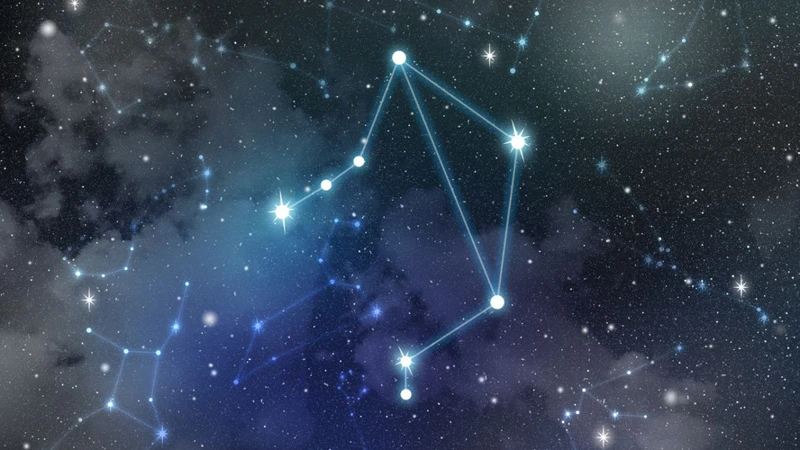
The Ophiuchus constellation holds a special place in the night sky, with its distinct features and astronomical significance. Positioned between the constellations of Scorpius and Sagittarius, Ophiuchus is notable for its unique shape, resembling a man grasping a serpent. This constellation is best observed in the northern hemisphere during the summer months when it appears high in the sky.
One of the notable features of the Ophiuchus constellation is the bright star known as Rasalhague, which represents the head of the serpent being held by Ophiuchus. Rasalhague is a binary star system consisting of a yellow-white giant star and a companion star. Its brightness and proximity to the ecliptic plane contribute to the prominence of the constellation.
The Ophiuchus constellation holds astronomical significance as well. It is home to a number of deep-sky objects, including globular clusters, star clusters, and nebulae. One famous cluster within Ophiuchus is Messier 10, a globular cluster composed of thousands of stars. Additionally, the Ophiuchus constellation intersects with the Milky Way, allowing for breathtaking views of dense star fields and cosmic dust clouds.
In terms of astrological significance, Ophiuchus has generated some controversy. While it is not officially recognized as one of the zodiac signs in mainstream astrology, there are those who believe that Ophiuchus should be included as the 13th zodiac sign. These proponents argue that the Earth’s alignment has slightly shifted since the creation of the astrological system, thus warranting the addition of Ophiuchus.
The Ophiuchus constellation remains a captivating celestial sight, with its distinctive shape and rich astronomical features. Whether gazing at its bright star, Rasalhague, or exploring its deep-sky objects, Ophiuchus offers a glimpse into the wonders of the universe and continues to spark curiosity and fascination among stargazers and astronomers.
1. Position in the Sky
The constellation of Ophiuchus occupies a prominent position in the sky, nestled between the constellations of Scorpius and Sagittarius. It can be found near the celestial equator, making it visible from both the Northern and Southern Hemispheres. Ophiuchus lies along the galactic plane, allowing for a stunning view of the Milky Way as it passes through the constellation.
To locate Ophiuchus, one can look for its brightest star, Rasalhague, which marks the head of the serpent bearer. Rasalhague is a binary star system composed of a yellow giant star and a companion star. From Rasalhague, the body of Ophiuchus extends upward, culminating in its northernmost point near the constellation Hercules. The celestial coordinates of Ophiuchus span approximately 240° to 270° right ascension and -5° to +30° declination.
During the summer months in the Northern Hemisphere, Ophiuchus can be observed in the southern sky, towering above the horizon. In the Southern Hemisphere, it is visible in the winter months, situated high overhead. The positioning of Ophiuchus in the sky grants astronomers and stargazers ample opportunity to appreciate its celestial beauty and explore its neighboring constellations.
The position of Ophiuchus in the sky holds astronomical significance. Its location close to the center of the Milky Way galaxy allows for a greater concentration of stars, deep sky objects, and celestial phenomena to be observed in the region. This makes Ophiuchus a target of interest for astronomers studying star formations, galactic structure, and even the existence of exoplanets within the constellation.
The position of Ophiuchus in the sky not only grants it visibility to the naked eye but also provides a celestial backdrop for cosmic exploration and research. Its close proximity to other constellations and its strategic position along the galactic plane make it a captivating and sought-after sight for astronomers and stargazers alike.
2. Notable Features
When exploring the notable features of the Ophiuchus constellation, one cannot overlook its prominent star, Rasalhague. Situated at the head of the serpent, Rasalhague is a bright star that shines with a bluish-white glow. With a magnitude of around 2.08, it is one of the most recognizable stars within Ophiuchus. Its name originates from the Arabic phrase meaning “the head of the serpent collector,” which aligns perfectly with the theme of the constellation. Rasalhague stands out among the surrounding stars, drawing attention to the celestial figure of Ophiuchus.
Another remarkable feature of Ophiuchus is its position in the sky. Positioned near the center of the celestial equator, this constellation plays a crucial role in the astronomical calendar. Ophiuchus lies along the ecliptic, which is the apparent path the Sun takes through the sky as seen from Earth. The presence of Ophiuchus in the ecliptic has led to discussions regarding its inclusion in the zodiac and its significance in astrology.
One captivating aspect of the Ophiuchus constellation is its visual representation. Often depicted as a figure holding a serpent, Ophiuchus embodies the connection between humans and serpents. This representation is deeply entrenched in various mythologies and symbolizes the power of healing and transformation. The imagery of a human grappling with a serpent is rich in metaphor and suggests the struggle to overcome challenges and tap into profound spiritual knowledge.
The notable features of Ophiuchus, from its distinctive star to its position in the sky and its powerful visual representation, contribute to its allure and captivate the imaginations of stargazers and astronomers alike. The combination of its intriguing features and its association with healing and transformation make Ophiuchus a constellation that stands out among the celestial wonders.
3. Astronomical Significance
The astronomical significance of Ophiuchus lies in its position in the sky and its notable features. Ophiuchus is situated between the constellations of Scorpius and Sagittarius and can be seen in the southern hemisphere during the summer months. Its location near the ecliptic, the apparent path of the Sun across the sky, means that the Sun passes through the constellation of Ophiuchus for about 18 days each year.
One notable feature of Ophiuchus is its brightest star, Rasalhague, which is located on the head of Ophiuchus. Rasalhague is a binary star system consisting of a yellow-white primary star and a smaller companion star. This striking star adds to the visual appeal and prominence of Ophiuchus in the night sky.
Beyond its visual appeal, Ophiuchus also holds astronomical significance in its association with some important celestial objects. One such object is the Barnard’s Star, which is one of the closest stars to our solar system. Barnard’s Star is a dim and faint red dwarf star, and its location in proximity to Ophiuchus makes it a point of interest for astronomers studying nearby stellar systems.
Another astronomical significance of Ophiuchus is its connection to the Ophiuchid meteor shower, also known as the Serpentids. This meteor shower occurs in mid-December and is associated with the debris left behind by the 26P/Grigg-Skjellerup comet. Though not as well-known as other meteor showers, the Ophiuchids offer a unique opportunity for stargazers and astronomers to witness these cosmic phenomena.
The astronomical significance of Ophiuchus lies in its position in the sky, its notable features such as the bright star Rasalhague, and its association with celestial objects like Barnard’s Star and the Ophiuchid meteor shower. These aspects make Ophiuchus a compelling constellation for astronomers and skywatchers alike, adding to its allure and fascination in the realm of astronomy.
The Significance in Modern Culture
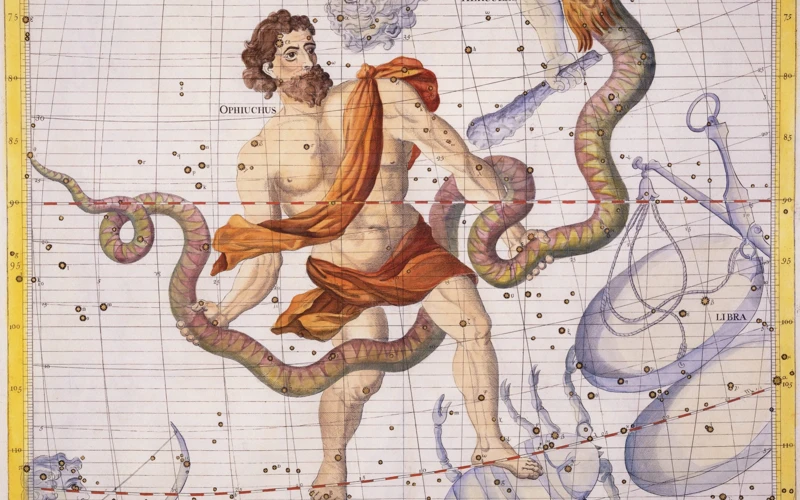
In modern culture, Ophiuchus has garnered attention and significance in various ways. Popular media has embraced the allure of this mysterious zodiac sign, featuring it in books, movies, and television shows. Its association with healing and wisdom often makes Ophiuchus a compelling character or symbol within these narratives. One notable example is the character of Doctor Strange from the Marvel Universe, who possesses exceptional healing abilities and utilizes his wisdom to navigate complex magical realms.
Astrological controversy has also contributed to the significance of Ophiuchus in modern culture. The addition of Ophiuchus as the “13th sign” in some astrological systems has sparked debates among astrologers and astrology enthusiasts. Some argue that including Ophiuchus provides a more accurate representation of the celestial alignments at the time of birth, while others maintain that it disrupts the established zodiac and lacks historical validation. This ongoing discussion and exploration of Ophiuchus in astrology have created a sense of intrigue and curiosity for those interested in the intricacies of the zodiac.
The significance of Ophiuchus extends beyond its portrayal in popular media and astrological debates. It has become a symbol of alternative perspectives and the exploration of uncharted territories. Ophiuchus invites individuals to explore the possibilities beyond the conventional zodiac and question traditional beliefs. It encourages a deeper understanding of hidden potentials, transformative qualities, and the interconnectedness of healing, wisdom, and spirituality.
In modern culture, Ophiuchus maintains its enigmatic presence, captivating the imagination and igniting discussions about its place in astrology and the broader realm of human consciousness. Whether portrayed through captivating characters or challenging astrological norms, Ophiuchus continues to leave its mark on contemporary society, reminding us that there is always more to discover and unravel in the vast celestial tapestry of our existence.
1. Ophiuchus in Popular Media
In popular media, Ophiuchus has made its presence known through various mediums, captivating audiences with its intriguing symbolism. One notable example of Ophiuchus in popular media is in the realm of astrology and horoscopes. With the resurgence of interest in zodiac signs and astrology, Ophiuchus has gained attention as the supposed “13th sign” of the zodiac. Its inclusion has sparked discussions and debates among astrology enthusiasts, who ponder its significance in relation to individual personalities and compatibility. Some argue that Ophiuchus represents unique traits and characteristics that can influence astrological readings, while others dismiss it as an unnecessary addition that disrupts the traditional zodiac system. Nonetheless, Ophiuchus continues to pique the curiosity of those seeking to explore the intricacies of astrology and its potential impact on their lives.
Ophiuchus has also made appearances in popular culture outside of the realm of astrology. In literature and films, Ophiuchus is often portrayed as a figure of wisdom, mysterious powers, and healing abilities. The symbolism associated with this constellation lends itself well to storytelling, offering a rich tapestry of possibilities for writers and filmmakers. From mystical characters with serpentine companions to healers with exceptional knowledge, Ophiuchus has become a source of inspiration for creative minds. It serves as a reminder of the enduring fascination with ancient myths and the allure of the unknown.
Ophiuchus has found its way into popular media, leaving an indelible mark on astrology enthusiasts and creative storytellers. Whether it is through its debated inclusion in astrological readings or its portrayal as a figure of wisdom and healing, Ophiuchus continues to captivate audiences and ignite the imagination. Its presence in popular media serves as a testament to the enduring symbolic significance of this mysterious constellation.
2. Ophiuchus and Astrological Controversy
Ophiuchus and its inclusion in astrology have stirred up significant controversy and debates within the astrological community. While the traditional zodiac consists of twelve signs, the emergence of Ophiuchus as a potential thirteenth sign has sparked discussions about its validity and impact on existing astrological interpretations.
One point of controversy revolves around the shifting of dates and the alignment of the zodiac signs. Ophiuchus is said to fall between Scorpio and Sagittarius, leading to speculation about the realignment of dates and the implications it may have on individuals’ astrological profiles. Some argue that this new addition disrupts the established system and renders previous interpretations inaccurate.
There are debates regarding the influence and significance of Ophiuchus in astrological readings. Supporters argue that incorporating Ophiuchus allows for a more accurate and nuanced understanding of individuals’ personalities and life paths. They believe that the inclusion of Ophiuchus enriches astrological interpretations with its unique characteristics and symbolism.
On the other hand, skeptics view Ophiuchus as a recent addition without substantial historical backing, dismissing its significance in astrological practice. They argue that the existing twelve signs already provide a comprehensive framework for understanding personality traits and life events, and the inclusion of Ophiuchus is unnecessary.
It’s important to note that despite the controversy, many astrologers continue to explore and study Ophiuchus in their practice, seeking to understand its potential influence and impact on individuals’ birth charts. Whether one embraces Ophiuchus as a valid astrological sign or sees it as a contested addition, the controversy surrounding Ophiuchus highlights the evolving nature of astrology and the ongoing exploration of its possibilities.
Internal Link: Astrological compatibility and rising sign relationships
Conclusion

In conclusion, the legends and symbolism of Ophiuchus unveil a captivating journey through ancient mythologies, astrology, and astronomical wonders. This 13th zodiac sign has its origins deeply rooted in Greek mythology, with the portrayal of Asclepius, the skilled healer and physician. Imhotep, the revered figure in Egyptian culture, further enhances the significance of Ophiuchus as a symbol of healing and divine knowledge. The inclusion of Ophiuchus in astrology has created both curiosity and controversy, with its association with wisdom, intuition, and spiritual connections. The Ophiuchus constellation, with its prominent position in the sky and notable features, continues to intrigue stargazers and astronomers alike. In modern culture, Ophiuchus has made appearances in popular media, sparking interest and discussions among enthusiasts. Although some may dismiss it as a recent addition without historical grounding, Ophiuchus maintains its mystique and allure. Whether we explore its symbolism in mythology, appreciate its astronomical significance, or ponder its representation in astrology, Ophiuchus remains an enigma waiting to be further unraveled.
Would you like to learn about the importance of devotion and worship in Hindu mythology related to Ophiuchus?
Frequently Asked Questions

1. What does Ophiuchus symbolize in astrology?
Ophiuchus is often associated with wisdom, healing abilities, intuition, and a deep spiritual connection. It represents a powerful archetype of a healer and seeker of knowledge.
2. Is Ophiuchus considered a zodiac sign?
While Ophiuchus is not recognized as one of the traditional 12 zodiac signs, it has gained attention as the “13th sign” due to its placement in the zodiac belt.
3. How does Ophiuchus relate to ancient Greek mythology?
Ophiuchus is associated with the Greek god Asclepius, the god of medicine and healing. Asclepius possessed the power to resurrect the dead, which later led to his immortalization as the constellation Ophiuchus.
4. What is the significance of the serpent symbolism in Ophiuchus?
The serpent is a symbol of rebirth, transformation, and healing in many cultures. In Ophiuchus, the serpent represents the power of medicinal knowledge and the ability to bring about transformation and renewal.
5. Can Ophiuchus have an impact on astrological compatibility?
While Ophiuchus is not traditionally included in astrological compatibility readings, some astrologers believe that its energy can influence relationships, adding a dimension of healing and spiritual connection.
6. How can Ophiuchus be identified in the night sky?
Ophiuchus can be found between the constellations of Scorpius and Sagittarius. Its distinctive shape resembles a man holding a snake, making it relatively easy to identify.
7. Are there any notable features within the Ophiuchus constellation?
Within the constellation of Ophiuchus lies the Ophiuchus Cluster, a group of galaxies located approximately 390 million light-years away from Earth. It is one of the richest galaxy clusters known.
8. Does Ophiuchus hold any astrological significance in predicting future events?
There is no scientific evidence to support the notion that Ophiuchus specifically predicts future events. Astrology, including Ophiuchus, is primarily focused on personality traits and patterns rather than predicting specific events.
9. How has Ophiuchus been portrayed in popular media?
Ophiuchus has made appearances in various forms of popular media, including books, movies, and TV shows. It is often depicted as a powerful healer or as a mystical figure with hidden knowledge.
10. Why is there controversy surrounding Ophiuchus in astrology?
The controversy surrounding Ophiuchus in astrology stems from the argument over its historical validity and its inclusion as a zodiac sign. Some astrologers embrace its significance, while others dismiss it as an addition without sufficient historical basis.
References
Frequently Asked Questions

1. Can you provide a brief overview of Ophiuchus?
Ophiuchus is a constellation located in the celestial equator. It is often referred to as the “Serpent Bearer” and represents a figure from ancient mythology.
2. What is the origin of Ophiuchus?
Ophiuchus has its roots in various ancient cultures, particularly Greek mythology and Egyptian culture, which have shaped its symbolism and interpretations.
3. How does Ophiuchus relate to Greek mythology?
In Greek mythology, Ophiuchus is associated with the story of Asclepius, the god of medicine and healing. Asclepius was represented by a serpent, which later became the symbol for Ophiuchus.
4. What role does Egyptian culture play in Ophiuchus?
In Egyptian culture, Ophiuchus is linked to Imhotep, a revered physician and high priest. Imhotep was known for his exceptional healing abilities, making him a fitting representation of Ophiuchus.
5. How is Ophiuchus interpreted in astrology?
Ophiuchus is considered the 13th zodiac constellation in Western astrology. Its placement in the zodiac chart influences traits such as wisdom, healing, and transformation.
6. What is the symbolism behind the serpent in Ophiuchus?
The serpent in Ophiuchus symbolizes rejuvenation, fertility, and transformation. It represents the healing powers of medicine and the shedding of old skin for personal growth.
7. What does Ophiuchus signify in terms of wisdom and healing?
Ophiuchus is associated with wisdom, healing, and profound knowledge. Those born under its influence are believed to possess innate wisdom and a natural affinity for the healing arts.
8. How does Ophiuchus relate to transformation and rebirth?
Ophiuchus embodies the concept of transformation and rebirth. It signifies the ability to overcome challenges and emerge stronger, representing a journey of personal growth and metamorphosis.
9. Where can the Ophiuchus constellation be found in the sky?
Ophiuchus can be found near the celestial equator, between the constellations of Scorpius and Sagittarius. It is visible in the northern hemisphere during specific times of the year.
10. Why is Ophiuchus significant in modern culture?
Ophiuchus has gained popularity in modern culture through its representation in various forms of media, and it has also sparked debates and controversies within the astrological community regarding its inclusion in the zodiac.

